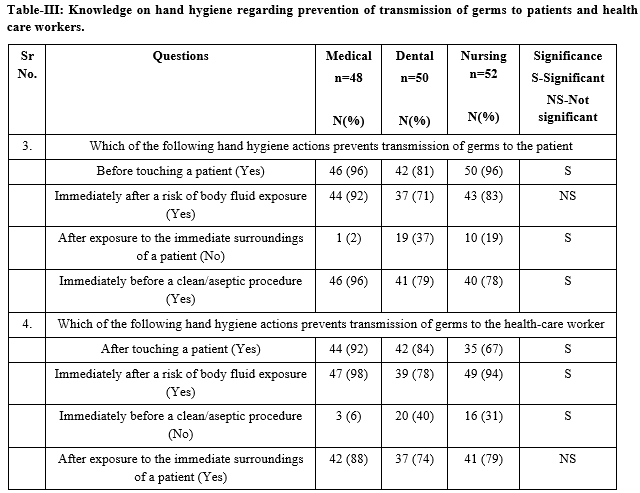A study on knowledge about hand hygiene among medical, dental and nursing students in Bangalore, Karnataka
Abstract
Introduction: Hands are the main pathway of germ transmission during health care. Health care associated infections are the major concern when it comes to patient safety. Lack of hand hygiene leads to a serious problem in health care services as they may cause prolonged hospital stay. This study aims at assessing and comparing the knowledge regarding hand hygiene among undergraduate medical, dental and nursing students.
Method: A cross-sectional, questionnaire-based study was undertaken among 150 undergraduate medical, dental and nursing students studying in a Tertiary care teaching Institute in Bangalore, Karnataka. Data collection was done using World Health Organization hand hygiene questionnaire for health care workers. Analysis was done using SPSS version 21.
Results: A total of 150 students participated in the study. Of these 48 were medical, 50 were dental and 52 were nursing students. Only 87 out of 150 (58%) students had received training in hand hygiene in past 3 yrs. The medical and nursing students had very poor knowledge that unclean hands of health care workers can transmit harmful germs to patients, whereas dental students had better knowledge about the same and the difference was statistically significant. Knowledge regarding washing of hands after exposure to blood was better among nursing students than medical and dental students.
Conclusion: The knowledge about hand hygiene was not satisfactory among the students. Hand hygiene training can be made mandatory for medical, dental and nursing students as they handle patients.
Downloads
References
Clean Care Is Safer Care. Geneva: World Health Organization Press; 2009. Available at: :http://whqlibdoc.who.int/publications/2009/9789241597906_eng.pdf. Accessed on 21.06.18
2. Hand hygiene: Why, How and When. Available at: www.who.int>gpsc>Hand_Hygiene.Accessed on 12.06.18
3. Allegranzi B., Nejad S. B., Combescure C., et al. Burden of endemic health-care-associated infection in developing countries:
systematic review and meta-analysis. The Lancet. 2011;377(9761):228–241. doi: 10.1016/s0140-6736(10)61458-4.[pubmed]
4. Methai E, Allegranzi B, Kilpatrick C, Pittet D.Prevention and control of health care associated infection through improved hand hygiene. Indian J Med Microbiology. 2010;28(2):100-6.[pubmed]
5. Rumbana R. Yu C,Pena A.A point –in-time observational study of hand hygiene practices of health care workers in Intensive Care Unit of St.Luke’sMedicalCenter. Phil J Microbiol Infect Dis.2001; 30:3-7.
6. Creeddon SA. Hand hygiene compliance; exploring variations in practice between hospital, Nurse Times. 2008 Dec;104(49):32-5.[pubmed]
7. Trick WE, Vernon MO, Hayes RA,Nathan C, Rice TW,Peterson BJ et al. Impact of ring wearing on hand contamination and comparison of hygiene agents in a hospital. Clin Infect Dis. 2003 Jun;36(11):1383-90.[pubmed]
8. Nabavi M., Alavi-Moghaddam M., Gachkar L., Moeinian M. Knowledge, attitudes, and practices study on hand hygiene among Imam Hossein Hospital’s
residents in 2013. Iranian Red Crescent Medical Journal. 2015;17(10) doi: 10.5812/ircmj.19606.e19606
9. AmissahI, Salia S, Craymah J. A Study to Assess Hand Hygiene Knowledge and Practices among Health Care Workers in a Teaching Hospital in Ghana.International Journal of Science and Research (IJSR).2016 Aug; 5(8):301-7.
10. Thakker VS, Jadhav PR. Knowledge of hand hygiene in undergraduate medical , dental and nursing students: A cross-sectional survey. J Family Med Prim Care. 2015;4:582-6.
11. Maheshwari V, Kaore NC, Ramnani VK, Gupta SK, Borle A, Kaushal R, et al. A study to assess knowledge and attitude regarding hand hygiene amongst
residents and nursing staff in a tertiary health care setting of bhopal city. J Clin Diagn Res. 2014;8:DC04–7.[pubmed]
12. Kamble VS, Biradar SM, Takpere A, Reddy S. Knowledge of hand hygiene practices among students of ESIC medical college, Gulbarga, Karnataka, India. Int J Community Med Public Health 2016;3:94-8.
13. Nair S. S., Hanumantappa R., Hiremath S. G., Siraj M. A., Raghunath P. Knowledge, Attitude, and Practice of hand hygiene among medical and nursing students at a tertiary health care centre in Raichur, India. ISRN Preventive Medicine. 2014;2014:4. doi: 10.1155/2014/608927.608927.
14. Sultana M., Mahumud R. A., Sarker A. R., Hossain S. M. Hand hygiene knowledge and practice among university students: evidence from Private Universities of Bangladesh. Risk Management and Healthcare Policy. 2016;9:13–20. doi: 10.2147/rmhp.s98311.
15. Goswami K, BaruahR .Study to Assess Knowledge, Attitude and Practice of hand hygiene among Medical and Nursing Students at Guwahati Medical College & Hospital, Guwahati, Assam. Indian J of Basic and Applied Medical Research.2016 Mar;5(2):322-28.
16. Hamadah R, Kharraz R, Alshanqity A, AlFawaz D, Eshaq AM, Abu-Zaid A, et al. Hand hygiene:Knowledge and attitudes of fourth-year clerkship medical students at alfaisal university, college of medicine, riyadh, Saudi Arabia. Cureus. 2015;7:e310.[pubmed]
17. Modi P D, Kumar P, Solanki R, et al. (July 12, 2017) Hand Hygiene Practices Among Indian Medical Undergraduates: A Questionnaire-Based Survey. Cureus 9(7): e1463. doi:10.7759/cureus.1463.[pubmed]
18. Bingawi1 H , Alghamdi N , AlghamdiS , Alghamdi M , Alghamdi N , Alzahrani A et al. Hand hygiene Perception and Knowledge of Albaha University Medical Students, 2016.IOSR Journal of Pharmacy.2017 Jan;7(1):37-45.

Copyright (c) 2018 Author (s). Published by Siddharth Health Research and Social Welfare Society

This work is licensed under a Creative Commons Attribution 4.0 International License.


 OAI - Open Archives Initiative
OAI - Open Archives Initiative


